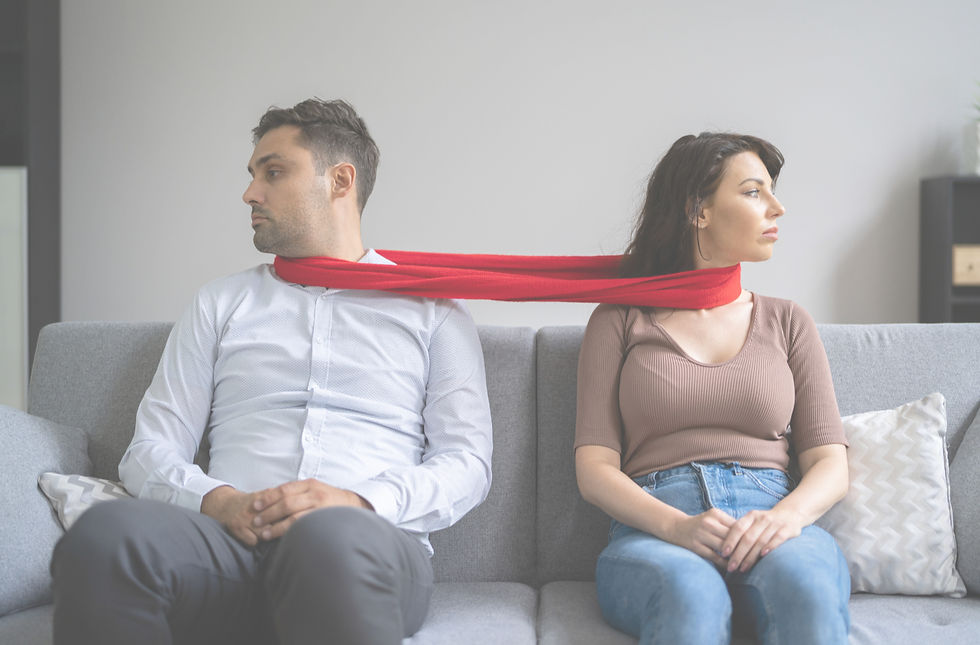What is Codependency?
- Kirstie Findlay

- Aug 21, 2025
- 4 min read
Codependency is the compulsive need to manage, fix or rescue others at the expense of your own wellbeing. Often mistaken for love or loyalty, codependency is in fact a survival strategy, an unconscious attempt to feel safe, worthy, or wanted by controlling how others feel or behave. It can show up as people pleasing, protecting the feelings of others, difficulty setting boundaries and a sense of emptiness when you're not needed by someone.
If you often feel overly responsible for others’ emotions or decisions, or if your self-worth is entangled with someone else’s approval or stability, you may be operating from a codependent mindset.

Why am I codependent?
We become codependent when we learn, often in childhood, that love is conditional. You may have grown up in a household where your emotional needs weren’t met unless you performed, behaved, or took on responsibilities beyond your years. Perhaps a caregiver was emotionally unavailable, addicted, ill, or unstable, and you learned to feel useful, or safe, by looking after them.
Codependency often arises when we were not taught how to regulate our emotions internally. So we turn outward, we soothe through the reassurance gained by managing other people. If they're OK, we feel OK. If they're upset, we feel panicked. This makes us hypervigilant and overly focused on others' needs, while our own go unmet and even unnoticed.
What does codependency look like in relationships?
In romantic relationships, codependency can look like doing too much, giving too much, or staying too long. You may ignore red flags, tolerate poor treatment, or lose your sense of identity. You might feel anxious when not in contact with your partner, or deeply unsettled if they pull away. You don’t just want them to be happy, you need them to be happy so you can feel safe.
In friendships and family dynamics, codependency may involve rescuing, over-functioning, or constantly checking in on others to ease your own anxiety. You might feel guilty for saying no, or responsible when others are in pain. You may try to save your family member/partner/friend from emotional pain by agreeing with them despite knowing what they are doing is wrong, you become complicit in hiding their poor behaviour from themselves. You likely struggle with boundaries, because deep down, you fear that setting limits will make you unlovable.
Is codependency the same as caring?
Caring and compassion are healthy and beneficial. Codependency is not care, it’s control disguised as compassion. It’s helping others not from generosity, but from fear - of rejection, abandonment and not being enough. Real care involves choice and boundaries. Codependency feels compulsive and urgent, like you have to help, fix, or manage, or else something terrible will happen.
In codependency, your giving is often tinged with resentment. You do things you don't want to do. You sacrifice your own needs and suppress your own voice, resulting in feeling bitter, burned out, or invisible. You may find yourself soothing with substances or other compulsive behaviours. Love doesn’t require self-erasure. If you are experiencing this, this is more like enmeshment.
How do I stop being codependent?
Healing from codependency begins with one core shift - putting your attention back on yourself and working to know, understand and accept who YOU are. That means noticing your own thoughts, feelings, needs, and limits. Ask yourself throughout the day: What do I feel right now? What do I need? What do I want? This can feel selfish at first, but it is not, it is the vital act of self connection.
Start setting boundaries, even small ones. Let someone sit with their own discomfort without rushing to fix it. Let someone be wrong about you. Say no without over-explaining. And when the guilt arises, remind yourself that others are allowed to be upset and you are allowed to take care of yourself. You can be an autonomous individual, with your own ideas and emotions, free to behave as you wish.
Working with a therapist who understands relational trauma or attachment issues can also help. Codependency is not just a set of behaviours, it’s an emotional wound. Therapy can provide a safe place to explore the origin of your caretaking habits, and to build new relational skills rooted in authenticity, not anxiety.
Can I have healthy relationships if I’m codependent?
You are in control of your behaviour and can choose to improve it should you wish. Codependency is rooted in your deep capacity for connection, you just need to rewire how you relate to others. Healthy relationships are built on mutual respect, emotional safety, and the freedom to be your full self. This includes disagreements, space, and autonomy, none of which should feel threatening.
In healing, you’ll learn that your worth is not dependent on being needed. You don’t have to be the rescuer, the fixer, or the glue that holds everyone together. You are allowed to have your own life and your own feelings and needs.
As you move out of codependent patterns, relationships will feel less intense but more authentic. Less chaotic, but more nourishing. You’ll stop walking on eggshells and start feeling more resilient and self assured.
How do I reclaim my self-worth?
The antidote to codependency is not independence, it’s about knowing yourself. You don’t need to cut everyone off or become emotionally detached. You can allow yourself to honour your emotions, build self-trust, and let others take responsibility for their own lives.
Practice gratitude and acknowledge your own emotional intelligence, your capacity to care, your loyalty and strength. These traits are valuable and should not be taken advantage of. You don’t need to prove your worth by giving yourself away.
Reclaim your power, let go of the need to be chosen and choose yourself. Choose peace over people pleasing and growth over guilt.





Comments